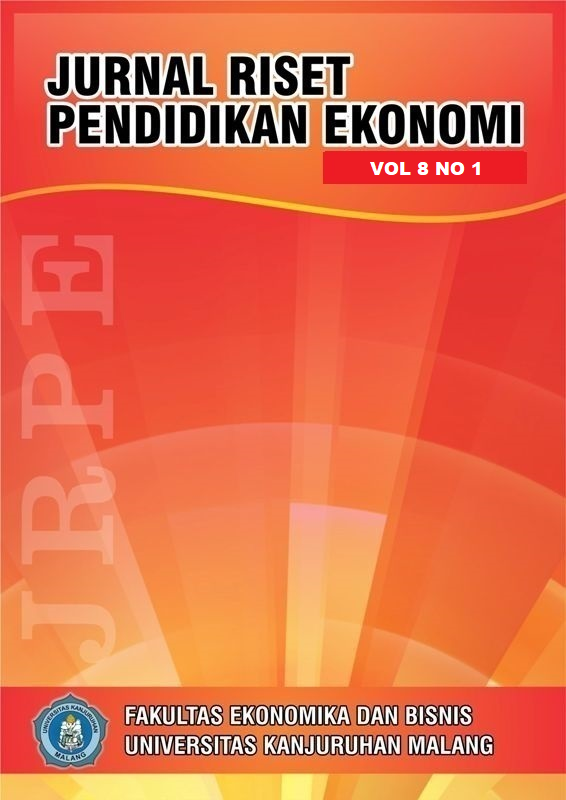Subsidi pemerintah dan rent-seeking : efisiensi investasi perusahaan BUMN di Indonesia
Main Article Content
Abstract
Government subsidy is one of the policy interventions to support economic growth and development. In developing countries, including Indonesia, the subsidy is vital for companies, especially State-Owned Enterprise (SOE), to increase investment efficiency. However, one way for the company to obtain a government subsidy is through the rent-seeking process. Therefore, this study is trying to investigate the significance of government subsidy and the rent-seeking process to investment efficiency. The independent variables in this study are the government subsidy and the rent-seeking process, while the investment efficiency is the dependent variable. This study also uses four control variables, return on asset (ROA), return on equity (ROE), growth, and board size. This research use data from 12 SOEs out of 109 SOEs for eight years (2013-2020) and utilised multivariable regression to analyse that. This study shows that government subsidy, rent-seeking, growth, and board size does not significantly affect investment efficiency.On the other hand, ROA and ROE have a significant negative relationship with investment efficiency. The finding from this study could be used for SOEs to optimise the government subsidy for investment efficiency. This study also uses the natural logarithm of cash given to the government to measure the rent-seeking variable as a novelty which differentiates from other studies.
Article Details
Jurnal Riset Pendidikan Ekonomi is licensed under a Creative Commons Attribution-ShareAlike 4.0 International License. The copyright of the received article once accepted for publication shall be assigned to the journal as the publisher.
References
Al’Alam, M. P. A., & Firmansyah, A. (2019). The effect of financial reporting quality, debt maturity, political connection, and corporate governance on investment efficiency: Evidence from Indonesia. International Journal of Innovation, Creativity and Change, 7(6), 39–56. https://www.researchgate.net/publication/337113410_The_Effect_of_Financial_Reporting_Quality_Debt_Maturity_Political_Connection_and_Corporate_Governance_on_Investment_Efficiency_Evidence_from_Indonesia
Afriyanti, Y., Sasana, H., & Jalunggono, G. (2018). Analisis Faktor-Faktor yang Mempengaruhi Konsumsi Energi Terbarukan di Indonesia. Directory Journal of Economic, 2(3), 865–884.
B, D. C., Yang, Z., Jiang, W., & Xu, Q. (2018). Proceedings of the Eleventh International Conference on Management Science and Engineering Management. Proceedings of the Eleventh International Conference on Management Science and Engineering Management, 1. https://doi.org/10.1007/978-3-319-59280-0
Chang, K., Wan, Q., Lou, Q., Chen, Y., & Wang, W. (2020). Green fiscal policy and firms’ investment efficiency: New insights into firm-level panel data from the renewable energy industry in China. Renewable Energy, 151(xxxx), 589–597. https://doi.org/10.1016/j.renene.2019.11.064
Chen, N., Sung, H. C., & Yang, J. (2017). Ownership structure, corporate governance and investment efficiency of Chinese listed firms. Pacific Accounting Review, 29(3), 266–282. https://doi.org/10.1108/PAR-12-2015-0046
Dharmayuni, L., & Suryati, L. (2014). Pengaruh Koneksi Politik, Struktur Kepemilikan Dan Laverage Terhadap Kinerja Perusahaan. Angewandte Chemie International Edition, 6(11), 951–952., 1(3), 35–54.
Hu, J., Jiang, H., & Holmes, M. (2019). Government subsidies and corporate investment efficiency: Evidence from China. Emerging Markets Review, 41. https://doi.org/10.1016/j.ememar.2019.100658
Jiahui, X., & Naysary, B. (2021). GOVERNMENT SUBSIDIES, RENT-SEEKING AND CORPORATE INVESTMENT EFFICIENCY: EVIDENCE FROM CHINA. Investment Management and Financial Innovations, 18(4), 380–392. https://doi.org/10.21511/imfi.18(4).2021.31
Li, S., Wu, H., & Jiang, X. (2018). Rent-seeking and firm value: Chinese evidence. Business and Politics, 20(2), 239–272. https://doi.org/10.1017/bap.2017.25
Liu, B., Lin, Y., Chan, K. C., & Fung, H. G. (2018). The dark side of rent-seeking: The impact of rent-seeking on earnings management. Journal of Business Research, 91(October 2017), 94–107. https://doi.org/10.1016/j.jbusres.2018.05.037
Liu, S., Lin, S., Sun, Z., & Yuan, L. (2021). Earnings management and firms’ investment behavior: The threshold effect of ROE. Emerging Markets Review, 47(January), 100797. https://doi.org/10.1016/j.ememar.2021.100797
Rizki Fitriani, D. (2021). Praktek Rent Seeking (Pemburu Rente): Praktek Politik Dan Bisnis Di Kalangan Birokrasi (Rent Seeking Practice: Political And Business Practices In The Bureaucracy) (Vol. 3). http://ejournal.unsub.ac.id/index.php/keuangan
Shin, K., Choy, M., Lee, C., & Park, G. (2019). Government R & D subsidy and additionality of biotechnology firms: The case of the South Korean Biotechnology Industry. Sustainability (Switzerland), 11(6). https://doi.org/10.3390/su11061583
Siregar, H. O., & Amalia, N. (2020). Manajemen Resiko Dan Efisiensi Investasi Pada Perusahaan Bumn Di Indonesia. Jurnal MONEX, 9, 97–108.
Zhang, M., Gao, S., Guan, X., & Jiang, F. (2014). Controlling Shareholder-Manager Collusion and Tunneling: Evidence from China. Corporate Governance: An International Review, 22(6), 440–459. https://doi.org/10.1111/corg.12081

